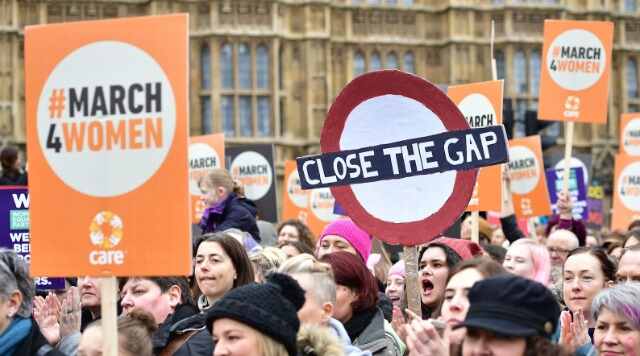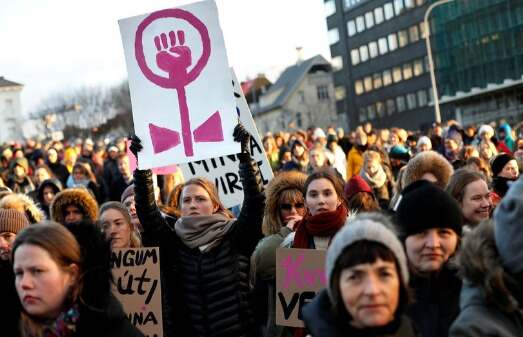Introduction
In protest of the ongoing gender pay gap and gender-based violence to support gender equality, thousands of women across Iceland — including Prime Minister Katrín Jakobsdóttir — participated in a one-day strike on October 24, 2023.
The discrimination women face in terms of the gender pay gap and the sexual violence against them are the two sides of the same coin. This was highlighted by the march and the protest made a very strong statement.
The strike’s website mentions how it was to bring to the notice the contribution of women and non-binary people in both, paid as well as unpaid labour. This is imperative for gender equality and valuing the position women hold in society.
First Full-Day Women’s Strike since 1975
This was the first such full-day women’s strike in the country since 1975 when 90% of Icelandic women refused to work as part of “kvennafrí” (women’s day off), leading to pivotal change including the world’s first female elected president of a country, moving towards gender equality.
“We’re talked about, Iceland is talked about, like it’s an equality paradise,” said Freyja Steingrímsdóttir, one of the strike organizers, “But an equality paradise should not have a 21% wage gap and 40% of women experiencing gender-based or sexual violence in their lifetime. That’s not what women around the world are striving for.” Having the global reputation that it does, Iceland has a responsibility to “make sure we live up to those expectations”, said Steingrímsdóttir.
Iceland has been ranked the best country in the world for women by the World Economic Forum (WEF) 14 years in a row. Despite Iceland’s achievement, organizers said significant issues persist. Thus, to deal with these issues, the gender pay gap being an important one, protests like this are significant.
Gender Pay Gap
The gender pay gap is a pervasive and complex issue that continues to be a source of concern worldwide. While significant progress has been made in recent decades to promote gender equality in the workplace, disparities in earnings between men and women persist.
The gender pay gap is the disparity in average earnings between men and women in the workforce. It is often expressed as a percentage, with women earning, on average, less than their male counterparts. The gap varies across countries and industries but remains a prevalent issue globally.

Causes, Consequences, and the Path Forward
Causes of the Gender Pay Gap
- Occupational Segregation: One of the primary drivers of the gender pay gap is occupational segregation. Women are often concentrated in lower-paying industries and roles, such as education, healthcare, and administrative positions, while men dominate higher-paying fields like technology, engineering, and finance.
- Unequal Pay for Equal Work: Even within the same occupation, women are frequently paid less than men for the same job, often due to discriminatory practices and negotiation differences.
- Lack of Representation in Leadership: Women are underrepresented in leadership and executive positions, which often come with higher salaries and bonuses. This lack of representation perpetuates the pay gap as women miss out on opportunities for career advancement and gender equality is left behind.
- Motherhood Penalty: When women become mothers, they often face discrimination and reduced earning potential. Maternity leave, lack of flexible work options, and unconscious bias all contribute to the so-called motherhood penalty.
- Limited Access to High-Paying Jobs: Structural factors, like access to quality education and networks, can also hinder women’s progression into high-paying positions.
Consequences of the Gender Pay Gap
The gender pay gap has far-reaching consequences, not only for women but for society as a whole:
- Economic Inequality: Persistent pay disparities contribute to economic inequality and hinder women’s ability to accumulate wealth, save for retirement, and achieve financial independence.
- Reduced Retirement Savings: Lower earnings throughout a woman’s career often result in reduced retirement savings and, ultimately, a higher risk of poverty in old age.
- Impact on Families: The gender pay gap affects families, as many households rely on women’s income. When women earn less, it can strain family finances and limit their ability to provide for their children.
- Stifling Talent and Innovation: Gender inequality in the workplace prevents organizations from fully leveraging the diverse talent pool, stifling innovation and growth.
Addressing the Gender Pay Gap
Efforts to close the gender pay gap require a multifaceted approach:
- Pay Transparency: Encourage companies to be transparent about their pay practices, making it easier to identify and address wage disparities.
- Equal Pay Legislation: Governments can enact and enforce equal pay laws to ensure that women are paid the same as men for equal work, leading to gender equality.
- Promote Gender Diversity: Encourage gender diversity in leadership positions through affirmative action, mentoring programs, and support for women’s career advancement.
- Support for Working Parents: Implement policies that support working parents, such as affordable childcare, paid parental leave, and flexible work arrangements.
- Education and Training: Invest in education and training programs to empower women and girls to pursue high-paying careers traditionally dominated by men.
Conclusion
The gender pay gap is a deeply entrenched issue with wide-ranging social and economic consequences. Addressing the gap requires a collective effort from governments, businesses, and individuals.
By promoting pay transparency, enacting equal pay legislation, and encouraging gender diversity in the workplace, we can take steps towards a more equitable future with more gender equality, where earnings are based on merit, not gender. Closing the gender pay gap is not just a matter of justice; it is essential for economic progress and social well-being.
Due to all these reasons, this protest for the gender pay gap in Iceland is an extremely significant power move that highlights the fact that women are capable enough of taking their agency.
WOMEN ARE EQUAL TO MEN AND IT IS A JUST DEMAND TO HAVE EQUAL PAY. GIVE WOMEN THEIR DUE.
-ADITYA SRIVASTAVA
MUST READ: EMBRACING ETHICAL RESEARCH – WITHDRAWAL OF STRAY DOGS FOR VACCINE TRIALS


